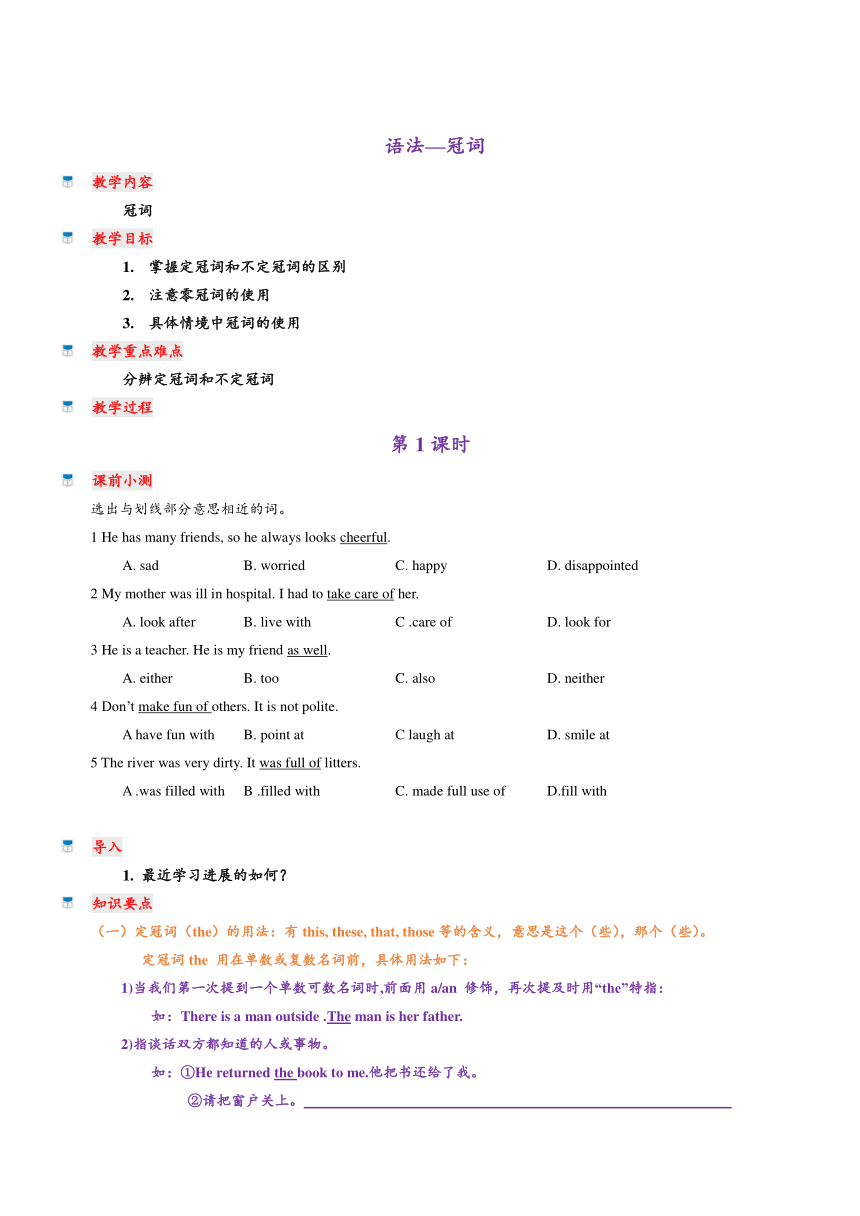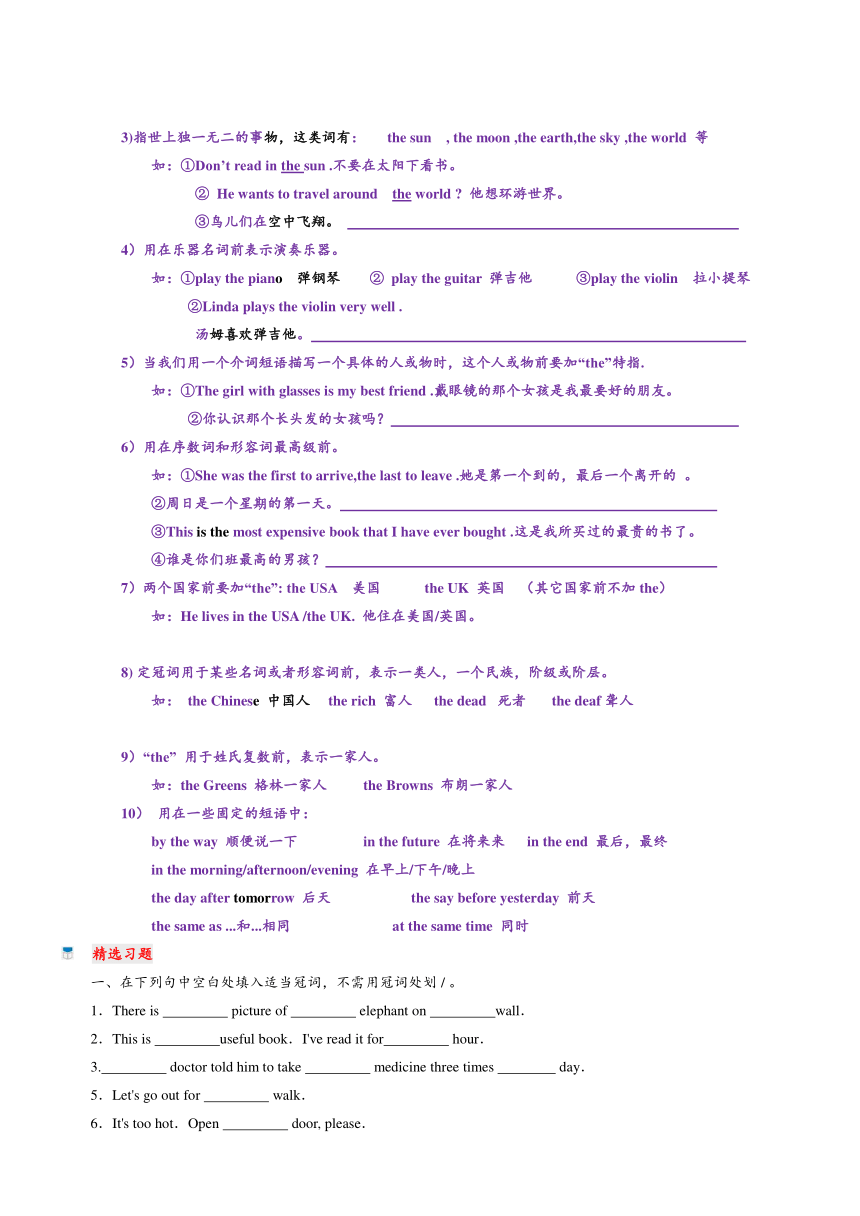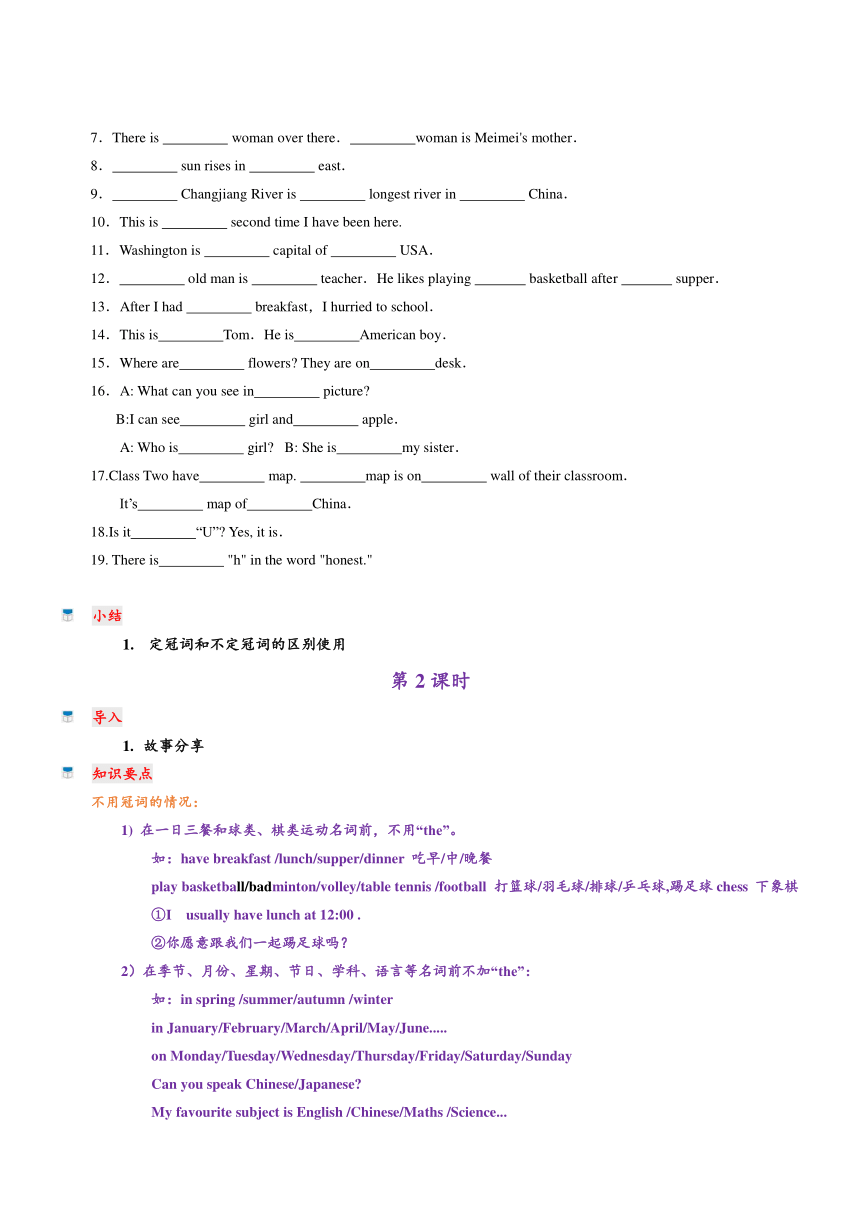七年级下册英语(深圳牛津)unit1语法--冠词
文档属性
| 名称 | 七年级下册英语(深圳牛津)unit1语法--冠词 |  | |
| 格式 | zip | ||
| 文件大小 | 26.9KB | ||
| 资源类型 | 教案 | ||
| 版本资源 | 牛津深圳版 | ||
| 科目 | 英语 | ||
| 更新时间 | 2015-04-29 17:21:03 | ||
图片预览



文档简介
语法—冠词
教学内容
冠词
教学目标
掌握定冠词和不定冠词的区别
注意零冠词的使用
具体情境中冠词的使用
教学重点难点
分辨定冠词和不定冠词
教学过程
第1课时
课前小测
选出与划线部分意思相近的词。
1 He has many friends, so he always looks cheerful.
A. sad B. worried C. happy D. disappointed
2 My mother was ill in hospital. I had to take care of her.
A. look after B. live with C .care of D. look for
3 He is a teacher. He is my friend as well.
A. either B. too C. also D. neither
4 Don’t make fun of others. It is not polite.
A have fun with B. point at C laugh at D. smile at
5 The river was very dirty. It was full of litters.
A .was filled with B .filled with C. made full use of D.fill with
导入
1. 最近学习进展的如何?
知识要点
(一)定冠词(the)的用法:有this,?these,?that,?those等的含义,意思是这个(些),那个(些)。
定冠词the 用在单数或复数名词前,具体用法如下:
1)当我们第一次提到一个单数可数名词时,前面用a/an 修饰,再次提及时用“the”特指:
如:There is a man outside .The man is her father.
2)指谈话双方都知道的人或事物。
如:①He returned the book to me.他把书还给了我。
②请把窗户关上。
3)指世上独一无二的事物,这类词有: the sun , the moon ,the earth,the sky ,the world 等
如:①Don’t read in the sun .不要在太阳下看书。
② He wants to travel around the world ? 他想环游世界。
③鸟儿们在空中飞翔。
4)用在乐器名词前表示演奏乐器。
如:①play the piano 弹钢琴 ② play the guitar 弹吉他 ③play the violin 拉小提琴
②Linda plays the violin very well .
汤姆喜欢弹吉他。
5)当我们用一个介词短语描写一个具体的人或物时,这个人或物前要加“the”特指.
如:①The girl with glasses is my best friend .戴眼镜的那个女孩是我最要好的朋友。
②你认识那个长头发的女孩吗?
6)用在序数词和形容词最高级前。
如:①She was the first to arrive,the last to leave .她是第一个到的,最后一个离开的 。
②周日是一个星期的第一天。
③This is the most expensive book that I have ever bought .这是我所买过的最贵的书了。
④谁是你们班最高的男孩?
7)两个国家前要加“the”: the USA 美国 the UK 英国 (其它国家前不加the)
如:He lives in the USA /the UK. 他住在美国/英国。
8)?定冠词用于某些名词或者形容词前,表示一类人,一个民族,阶级或阶层。
如: the?Chinese??中国人?????the?rich??富人??????the?dead???死者???????the?deaf?聋人?
9)“the” 用于姓氏复数前,表示一家人。
如:the Greens 格林一家人 the Browns 布朗一家人
10) 用在一些固定的短语中:
by the way 顺便说一下 in the future 在将来来 in the end 最后,最终
in the morning/afternoon/evening 在早上/下午/晚上
the day after tomorrow 后天 the say before yesterday 前天
the same as ...和...相同 at the same time 同时
精选习题
一、在下列句中空白处填入适当冠词,不需用冠词处划?/?。?
1.There?is? ?picture?of? ?elephant?on? wall.?
2.This?is? useful?book.I've?read?it?for ?hour.?
3. ?doctor?told?him?to?take? ?medicine?three?times? ?day.?
5.Let's?go?out?for? ?walk.?
6.It's?too?hot.Open? ?door,?please.?
7.There?is? ?woman?over?there. woman?is?Meimei's?mother.?
8. ?sun?rises?in? ?east.?
9. ?Changjiang?River?is? ?longest?river?in? ?China.?
10.This?is? ?second?time?I?have?been?here.?
11.Washington?is? ?capital?of? ?USA.?
12. ?old?man?is? ?teacher.He?likes?playing? ?basketball?after? ?supper.?
13.After?I?had? ?breakfast,I?hurried?to?school.?
14.This?is Tom.He?is American?boy.?
15.Where?are ?flowers??They?are?on desk.?
16.A:?What?can?you?see?in ?picture???
?B:I?can?see ?girl?and ?apple.?
A:?Who?is ?girl????B:?She?is my?sister.?
17.Class?Two?have ?map.? map?is?on ?wall?of?their?classroom.
It’s ?map?of China.?
18.Is?it “U”??Yes,?it?is.?
19.?There?is ?"h"?in?the?word?"honest."?
小结
定冠词和不定冠词的区别使用
第2课时
导入
1. 故事分享
知识要点
不用冠词的情况:
1) 在一日三餐和球类、棋类运动名词前,不用“the”。
如:have breakfast /lunch/supper/dinner 吃早/中/晚餐
play basketball/badminton/volley/table tennis /football 打篮球/羽毛球/排球/乒乓球,踢足球chess 下象棋
①I usually have lunch at 12:00 .
②你愿意跟我们一起踢足球吗?
在季节、月份、星期、节日、学科、语言等名词前不加“the”:
如:in spring /summer/autumn /winter
in January/February/March/April/May/June.....
on Monday/Tuesday/Wednesday/Thursday/Friday/Saturday/Sunday
Can you speak Chinese/Japanese?
My favourite subject is English /Chinese/Maths /Science...
当名词前有指示代词或物主带词修饰时,名词前不加“the”:
如;Please give me that book .请给我那本书。(指示代词:this,that,these,those)
I can’t find my keys . 我找不到我的钥匙。
4)用在一些固定搭配中:
in bed 在床上睡觉 at home 在家 on foot 步行 in class 在上课
at school 在上学 go to work 去上班 go to university 上大学
at noon /dawn /night 在中午/黎明/晚上
by bus /train /plane / bike 乘公交/火车/飞机/骑自行车
【巧记妙学】 特指双方熟悉,上文已经提及;世上独一无二,方位名词乐器;
某些专有名词,外加复数姓氏;序数词最高级,习惯用语特别记。
精选习题
二、单选填空。?
1 --Do you know _____ girl with hair?
--No, I don’t. I think she is __________girl who looks like Lucy.
A. a, a B. the, the C. the, a D. a, the
2 Alice is interested in playing ________piano while Mary loves listening to _________music.
A. /, the B. the,/ C. the, the D. /, /
3 --Do you know where Lily lives now? Is she in ______ Britain.
--No, she is in _____China.
A. /, the B. the, / C. the, the D. /,/
4 Every summer, _______ Greens go for ______ holiday in Paris.
A. the, / B. /, a C. the, a D. a, the
5 In this village, ______ young all want to go to ______ Shanghai to make money.
A. the, / B. the, a C. the, the D. /, the
6 ______ new bridge has been built for two years.
A. The B. A. C. / D. An
7 --Did you see _____ red pen? I put it on the table his morning.
--Was it _____ black one? I just picked it up from the floor.
A. a ,the B. the, the C. the, a D. /, a
8 Hanmeimei is _______ Chinese girl. Lucy is ______ English girl.
A. a,a B. an,an C. a,an D. an, a
9 The computer is _____ useful tool in _____ world today.
A. an ,the B. a, the C. the, the D. a,a
10 --Do you play ____ piano in your free time?
--No, I play _____ basketball with my friends.
A. the, the B. / , the C. a, a D. the, /
11 --How about _____ show of the animals?
--It was ____ great show . We all liked it.
A. a, the B. the, a C. a, a D. the, the
12 --Who is that man? ______ one with long hair.
--Oh, that’s Mr Mark. He is an artist.
A. A. B. An C. The D. /
13 My hobby is playing _____ chess and playing _____ guitar.
A. the, the B. a, the C. the, / D. /, the
14 There is ____ big square in ____ center of our city.
A. a, the B. the, a C. the, / D. /, the
15 More and more foreign students come to China to learn _____ Chinese.
A. a B. an C. the D. /
16 He is ____ university student and he comes from _____ island in England.
A. an,an B. an,a C. a,an D. a,a
17 --What’s the matter with you?
--I caught ______ bad cold and had to stay in _____ bed.
A. the, the B. a, the C. a,a D. a, /
18 --Why did you laugh just now?
--Ted wanted to tell us ____ every funny story, but he forgot _____ end himself.
A. a, an B. the, the C. the, a D. a, the
19 --Can you see _____ science book on the desk?--No, it’s ____ English book.
A. the, an B. a,an C. a, the D. the, the
20. Jack bought _____ useful book. ______ book is also very interesting.
A. an ,The B. a, The C. an ,A. D. a, A
小结
1.冠词的使用
课后练习
?三.完形填空?
A??French?student?went?to?London?for?his?holiday.?He?thought,?“I?know?a?little?English.?I?think?people?can??1??me.”?? One?day?he?went?to?a?restaurant?and?sat?down?at?the?table.?He?wanted?to? ?2???a?cup?of?tea?and some?eggs.?Soon?the?waiter came?up?to?him,?and?asked,?“Can?I?help?you?”?“A?cup?of?tea?and…”?he ?could? not?remember?the??3??word?for?eggs.?He?looked ?4??him,?but?nobody?was?eating?eggs.?Then?he??5??a?picture-book?on?the?table?next?to?him.?There? was ?a?picture?of?a?cock?on??6? cover(封面).?He 7 the?picture?to?the?waiter.?“What’s?the?English??8??this?”?he?asked.?“A?cock,” answered?the?waiter. “What?do?you?call?a?cock’s?wife?”?he?asked?again.?“A?hen.” “And?what?do?you?call?a?hen’s?children?”“?Chicks.”?“And?what?do?you?call?chicks?? 9?? they’re?born?”?“Eggs.” “Very?well,”?said?the?French?student?happily.?“Bring?me?two?eggs?and?a?cup?of?tea,?please.”?And?he?sat?down? ?10? ?a?smile?on?his?face.?
A. understand B. know C. help D. speak
A. drink B. take C. have D. eat
A. French B. Chinese C. new D. English
A. at B. for C. after D. around
A. saw B. had C. bought D. drew
A. it B. it’s C. its D. His
A. drew B. put C. gave D. showed
A. for B. of C. in D. about
A. when B. before C. after D. if
A. of B. with C. in D. about
课后记
教学内容
冠词
教学目标
掌握定冠词和不定冠词的区别
注意零冠词的使用
具体情境中冠词的使用
教学重点难点
分辨定冠词和不定冠词
教学过程
第1课时
课前小测
选出与划线部分意思相近的词。
1 He has many friends, so he always looks cheerful.
A. sad B. worried C. happy D. disappointed
2 My mother was ill in hospital. I had to take care of her.
A. look after B. live with C .care of D. look for
3 He is a teacher. He is my friend as well.
A. either B. too C. also D. neither
4 Don’t make fun of others. It is not polite.
A have fun with B. point at C laugh at D. smile at
5 The river was very dirty. It was full of litters.
A .was filled with B .filled with C. made full use of D.fill with
导入
1. 最近学习进展的如何?
知识要点
(一)定冠词(the)的用法:有this,?these,?that,?those等的含义,意思是这个(些),那个(些)。
定冠词the 用在单数或复数名词前,具体用法如下:
1)当我们第一次提到一个单数可数名词时,前面用a/an 修饰,再次提及时用“the”特指:
如:There is a man outside .The man is her father.
2)指谈话双方都知道的人或事物。
如:①He returned the book to me.他把书还给了我。
②请把窗户关上。
3)指世上独一无二的事物,这类词有: the sun , the moon ,the earth,the sky ,the world 等
如:①Don’t read in the sun .不要在太阳下看书。
② He wants to travel around the world ? 他想环游世界。
③鸟儿们在空中飞翔。
4)用在乐器名词前表示演奏乐器。
如:①play the piano 弹钢琴 ② play the guitar 弹吉他 ③play the violin 拉小提琴
②Linda plays the violin very well .
汤姆喜欢弹吉他。
5)当我们用一个介词短语描写一个具体的人或物时,这个人或物前要加“the”特指.
如:①The girl with glasses is my best friend .戴眼镜的那个女孩是我最要好的朋友。
②你认识那个长头发的女孩吗?
6)用在序数词和形容词最高级前。
如:①She was the first to arrive,the last to leave .她是第一个到的,最后一个离开的 。
②周日是一个星期的第一天。
③This is the most expensive book that I have ever bought .这是我所买过的最贵的书了。
④谁是你们班最高的男孩?
7)两个国家前要加“the”: the USA 美国 the UK 英国 (其它国家前不加the)
如:He lives in the USA /the UK. 他住在美国/英国。
8)?定冠词用于某些名词或者形容词前,表示一类人,一个民族,阶级或阶层。
如: the?Chinese??中国人?????the?rich??富人??????the?dead???死者???????the?deaf?聋人?
9)“the” 用于姓氏复数前,表示一家人。
如:the Greens 格林一家人 the Browns 布朗一家人
10) 用在一些固定的短语中:
by the way 顺便说一下 in the future 在将来来 in the end 最后,最终
in the morning/afternoon/evening 在早上/下午/晚上
the day after tomorrow 后天 the say before yesterday 前天
the same as ...和...相同 at the same time 同时
精选习题
一、在下列句中空白处填入适当冠词,不需用冠词处划?/?。?
1.There?is? ?picture?of? ?elephant?on? wall.?
2.This?is? useful?book.I've?read?it?for ?hour.?
3. ?doctor?told?him?to?take? ?medicine?three?times? ?day.?
5.Let's?go?out?for? ?walk.?
6.It's?too?hot.Open? ?door,?please.?
7.There?is? ?woman?over?there. woman?is?Meimei's?mother.?
8. ?sun?rises?in? ?east.?
9. ?Changjiang?River?is? ?longest?river?in? ?China.?
10.This?is? ?second?time?I?have?been?here.?
11.Washington?is? ?capital?of? ?USA.?
12. ?old?man?is? ?teacher.He?likes?playing? ?basketball?after? ?supper.?
13.After?I?had? ?breakfast,I?hurried?to?school.?
14.This?is Tom.He?is American?boy.?
15.Where?are ?flowers??They?are?on desk.?
16.A:?What?can?you?see?in ?picture???
?B:I?can?see ?girl?and ?apple.?
A:?Who?is ?girl????B:?She?is my?sister.?
17.Class?Two?have ?map.? map?is?on ?wall?of?their?classroom.
It’s ?map?of China.?
18.Is?it “U”??Yes,?it?is.?
19.?There?is ?"h"?in?the?word?"honest."?
小结
定冠词和不定冠词的区别使用
第2课时
导入
1. 故事分享
知识要点
不用冠词的情况:
1) 在一日三餐和球类、棋类运动名词前,不用“the”。
如:have breakfast /lunch/supper/dinner 吃早/中/晚餐
play basketball/badminton/volley/table tennis /football 打篮球/羽毛球/排球/乒乓球,踢足球chess 下象棋
①I usually have lunch at 12:00 .
②你愿意跟我们一起踢足球吗?
在季节、月份、星期、节日、学科、语言等名词前不加“the”:
如:in spring /summer/autumn /winter
in January/February/March/April/May/June.....
on Monday/Tuesday/Wednesday/Thursday/Friday/Saturday/Sunday
Can you speak Chinese/Japanese?
My favourite subject is English /Chinese/Maths /Science...
当名词前有指示代词或物主带词修饰时,名词前不加“the”:
如;Please give me that book .请给我那本书。(指示代词:this,that,these,those)
I can’t find my keys . 我找不到我的钥匙。
4)用在一些固定搭配中:
in bed 在床上睡觉 at home 在家 on foot 步行 in class 在上课
at school 在上学 go to work 去上班 go to university 上大学
at noon /dawn /night 在中午/黎明/晚上
by bus /train /plane / bike 乘公交/火车/飞机/骑自行车
【巧记妙学】 特指双方熟悉,上文已经提及;世上独一无二,方位名词乐器;
某些专有名词,外加复数姓氏;序数词最高级,习惯用语特别记。
精选习题
二、单选填空。?
1 --Do you know _____ girl with hair?
--No, I don’t. I think she is __________girl who looks like Lucy.
A. a, a B. the, the C. the, a D. a, the
2 Alice is interested in playing ________piano while Mary loves listening to _________music.
A. /, the B. the,/ C. the, the D. /, /
3 --Do you know where Lily lives now? Is she in ______ Britain.
--No, she is in _____China.
A. /, the B. the, / C. the, the D. /,/
4 Every summer, _______ Greens go for ______ holiday in Paris.
A. the, / B. /, a C. the, a D. a, the
5 In this village, ______ young all want to go to ______ Shanghai to make money.
A. the, / B. the, a C. the, the D. /, the
6 ______ new bridge has been built for two years.
A. The B. A. C. / D. An
7 --Did you see _____ red pen? I put it on the table his morning.
--Was it _____ black one? I just picked it up from the floor.
A. a ,the B. the, the C. the, a D. /, a
8 Hanmeimei is _______ Chinese girl. Lucy is ______ English girl.
A. a,a B. an,an C. a,an D. an, a
9 The computer is _____ useful tool in _____ world today.
A. an ,the B. a, the C. the, the D. a,a
10 --Do you play ____ piano in your free time?
--No, I play _____ basketball with my friends.
A. the, the B. / , the C. a, a D. the, /
11 --How about _____ show of the animals?
--It was ____ great show . We all liked it.
A. a, the B. the, a C. a, a D. the, the
12 --Who is that man? ______ one with long hair.
--Oh, that’s Mr Mark. He is an artist.
A. A. B. An C. The D. /
13 My hobby is playing _____ chess and playing _____ guitar.
A. the, the B. a, the C. the, / D. /, the
14 There is ____ big square in ____ center of our city.
A. a, the B. the, a C. the, / D. /, the
15 More and more foreign students come to China to learn _____ Chinese.
A. a B. an C. the D. /
16 He is ____ university student and he comes from _____ island in England.
A. an,an B. an,a C. a,an D. a,a
17 --What’s the matter with you?
--I caught ______ bad cold and had to stay in _____ bed.
A. the, the B. a, the C. a,a D. a, /
18 --Why did you laugh just now?
--Ted wanted to tell us ____ every funny story, but he forgot _____ end himself.
A. a, an B. the, the C. the, a D. a, the
19 --Can you see _____ science book on the desk?--No, it’s ____ English book.
A. the, an B. a,an C. a, the D. the, the
20. Jack bought _____ useful book. ______ book is also very interesting.
A. an ,The B. a, The C. an ,A. D. a, A
小结
1.冠词的使用
课后练习
?三.完形填空?
A??French?student?went?to?London?for?his?holiday.?He?thought,?“I?know?a?little?English.?I?think?people?can??1??me.”?? One?day?he?went?to?a?restaurant?and?sat?down?at?the?table.?He?wanted?to? ?2???a?cup?of?tea?and some?eggs.?Soon?the?waiter came?up?to?him,?and?asked,?“Can?I?help?you?”?“A?cup?of?tea?and…”?he ?could? not?remember?the??3??word?for?eggs.?He?looked ?4??him,?but?nobody?was?eating?eggs.?Then?he??5??a?picture-book?on?the?table?next?to?him.?There? was ?a?picture?of?a?cock?on??6? cover(封面).?He 7 the?picture?to?the?waiter.?“What’s?the?English??8??this?”?he?asked.?“A?cock,” answered?the?waiter. “What?do?you?call?a?cock’s?wife?”?he?asked?again.?“A?hen.” “And?what?do?you?call?a?hen’s?children?”“?Chicks.”?“And?what?do?you?call?chicks?? 9?? they’re?born?”?“Eggs.” “Very?well,”?said?the?French?student?happily.?“Bring?me?two?eggs?and?a?cup?of?tea,?please.”?And?he?sat?down? ?10? ?a?smile?on?his?face.?
A. understand B. know C. help D. speak
A. drink B. take C. have D. eat
A. French B. Chinese C. new D. English
A. at B. for C. after D. around
A. saw B. had C. bought D. drew
A. it B. it’s C. its D. His
A. drew B. put C. gave D. showed
A. for B. of C. in D. about
A. when B. before C. after D. if
A. of B. with C. in D. about
课后记
